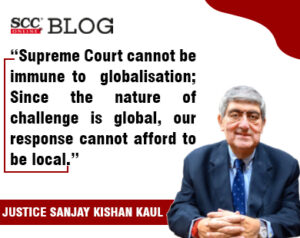Supreme Court: On the celebration of 73rd anniversary of the establishment of Supreme Court of India on 04-02-2023, Justice Sanjay Kishan Kaul addressed the gathering in the presence of Justice Sundaresh Menon, the Chief Justice of Supreme Court Singapore; Dr. Justice D.Y. Chandrachud, Chief Justice of India; Justice K.M. Joseph and Justice Ajay Rastogi.
He commenced his speech by navigating through the history of Indian legal system. He stated that even though the origins of Supreme Court of India as the apex judicial institution in the country were contested, were still easier to trace. “The journey commenced in 1950 when the Supreme Court assumed its duty from the Federal Court of India which at the time was supervised by Privy Council. At this point, the Court conducted its sitting in Parliament House until it moved to its present, more iconic venue in 1958.”
He spoke about how Supreme Court naturally found itself in the midst of India’s intensely political atmosphere and the fact that after independence, the Country was bourgeoning with different aspirations, particularly with respect to the areas of economic development and social reform. He added that the Country had to re-orient itself, sometimes radically, in the face of different challenges. One of the main concerns post-Independence was to play a “supporting role in the institution-building process, cautiously developing its own sphere of influence”.
Applauding the Constitution for granting the top judiciary a “regnant and critical position in this process” Justice Kaul stated that it acted as the “apex arbitrator of disputes, being limited only by the boundaries it set upon itself, and the confines of the Constitution itself”.
He was of the view that even though the Supreme Court was rightly believed to be the custodian of fundamental rights and the defender of individual freedoms, it was still difficult to dispassionately evaluate the positions taken up by the Court, particularly through a social, historical, and comparative lens.
“Later, during periods of economic instability, the Court took a more active role in questions relating to the economic order, such as through its decision in the bank nationalization case. Post Emergency came a period where the Supreme Court took up the task of administrative review in a more serious way and started developing a rigorous due-process jurisprudence through cases, including Maneka Gandhi v. Union of India1. Then came the advent of public interest litigation, which has become synonymous with rights-based litigation in India today,” he said.
Justice Kaul asserted that the Supreme Court is under intense scrutiny on a daily basis while emphasizing that functioning of the Apex Court is always influenced by the dynamics of contemporary political forces, dominant economic realities and landmark social events.
He was of the view that the Supreme Court, like any other social entity, cannot be immune or remain as mute spectators to the process of globalization and multiculturalism that are rapidly reconstituting the world as we know it and added, since the nature of the challenge was global, our response could not be local. He emphasised on the fact that the domestic laws were increasingly affected by happenings in other parts of the world and progressive judicial decisions in other countries can have a resonating effect in other jurisdictions, forcing an examination of one’s own rules and methods.
He said that the Supreme Court was part of a larger global fabric, i.e., an order underpinned by the rule of law.
“Rule of law stands as the antinomy of capriciousness, despotism, arbitrariness, and tyranny; and can thus be considered a truly international and intrinsic human value. As defenders of this ideal, courts all across the world converse in a shared language – of liberty, democracy, and equality,” justice Kaul asserted.
*Simran Singh, Editorial Assistant summated the data.

